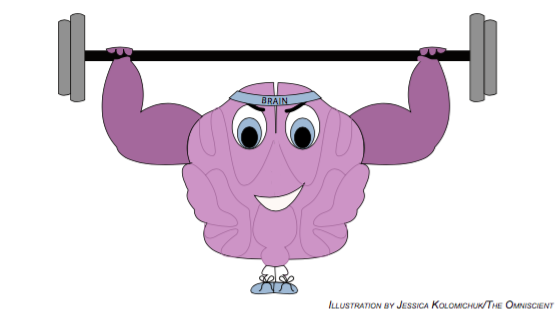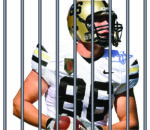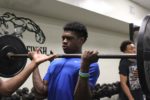The game clock is winding down, you only have a few more seconds to win the game and your final shot must be precise. You have rehearsed this play in practice every day. However, you have not rehearsed your mentality under stressful situations.
According to Thinksport Consulting Services, sports are 90 percent mental, but usually, athletes only focus on the physical part of competing. Junior quarterback Alex Parker believes that an athlete’s mentality is what separates them on the field.
“Anybody can lift weights or run,” Parker said. “When you get to the point where you don’t think you can do anything else, that’s when you make the mental decision to keep going and put yourself above others.”
Junior Chris Keesor, cross-country and track team member, believes that because of their mentality, athletes don’t reach their full potential.
“There’s so much more inside of you than you think, until you just push through the mental barrier,” Keesor said.
Senior Hannah Fowler plays shortstop for the softball team. She believes that the mental aspect of the game has a large influence on how athletes perform.
“Your physical ability really means nothing if you can’t focus on the game or properly think about what you’re doing,” Fowler said. “If you’re mentally focused on the sport, then I feel like you’re more driven to work harder, and then your physical ability will improve because you’re more focused.”
Depending on the coach’s technique, a team may focus more on one aspect than the other. For girls’ basketball, they read a book focusing solely on the mental aspect of the game. This year, the team read the book The Energy Bus by Jon Gordon. The book focused on how everyone must be able to work together to perform well. For junior Erika Nettles, reading the book helped the team both mentally and physically throughout their season. Nettles stated that working together, or “getting on the same bus,” was a big step for her.
“Mainly just to get on the bus is huge for me; I realized that [I] personally wouldn’t be able to get on the bus if I didn’t change my attitude and my perspective,” Nettles said. “The book focused on smaller parts of your game that I would have never noticed. Throughout the book it was mostly little key concepts that made me focus during the game and that helped the team win.”
In her paper, Emotions in Sport: The Effect of Conflict on Collegiate Athlete’s Emotional Contagion, Self efficacy, and Cohesion, Valeska Hoath of the University of Portland states, “team cohesion has been positively linked to a number of important outcomes including increased willingness to accept responsibility for negative results.”
Fowler relies on her team to keep her positive after tough plays.
“I really lean on my teammates because they are able to keep me up and keep me focused on the game; they help me get over things,” Fowler said.
Freshman golfer Alex Snively believes that teams promote positivity. Snively didn’t start out the season like he wanted, but he stayed positive with help from his team.
“It’s easier with a team,” Snively said. “You aren’t always going to be in a good mood when you’re by yourself, but with a team you have people to cheer you up.”
Fowler believes that mood can make a difference in performance.
“It definitely helps because I feel like when I’m in a good mood, I am more focused on everything that is going on,” Fowler said. “If I’m in a bad mood, and I’m stuck on something specific that happened, then I’m not able to see everything in the game, and I’m not as focused as I should be.”
Even though sports involve a lot of physical skill, volleyball and swim coach Lyn Smith believes that mentality is a key aspect in any sport.
“I do believe that the mental challenge is there, because if the mental challenge is not there, the physical can’t be, because you’ve already set yourself up before you walk out on the court,” Smith said. “It’s just something athletes have to work on. You have to tell yourself up front it’s not going to come easy…. I think today kids need to put in harder work. They want to be a state champion, but do they want to put in the work to be a state champion, and in doing that, do you want to take time to mentally prepare?”
– By Cooper Patterson



